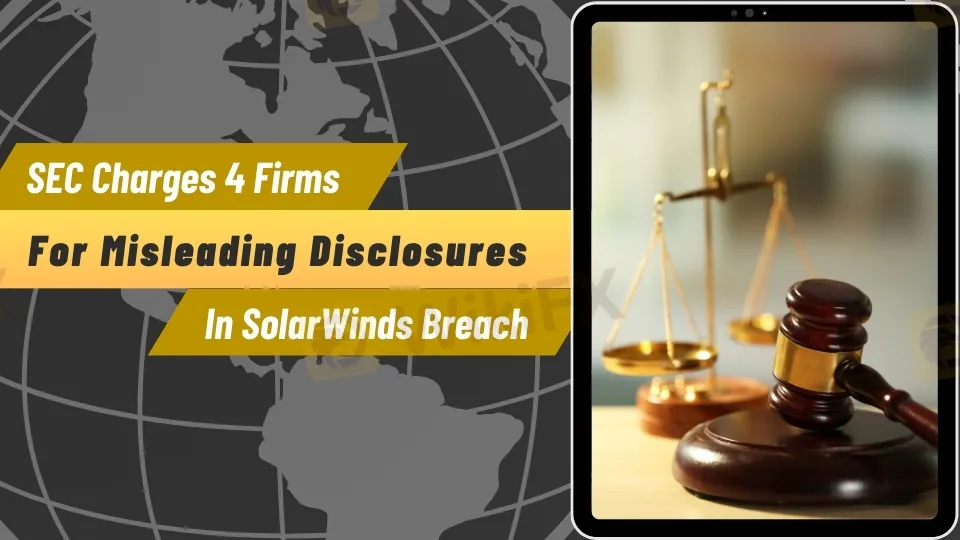简体中文
繁體中文
English
Pусский
日本語
ภาษาไทย
Tiếng Việt
Bahasa Indonesia
Español
हिन्दी
Filippiiniläinen
Français
Deutsch
Português
Türkçe
한국어
العربية
SEC Charges 4 Firms for Misleading Disclosures in SolarWinds Breach
Abstract:SEC charges Unisys, Avaya, Check Point, and Mimecast for misleading disclosures in the 2020 SolarWinds breach. Fines highlight cybersecurity risks and disclosure violations.

The U.S. Securities and Exchange Commission (SEC) has fined four companies—Unisys Corp., Avaya Holdings Corp., Check Point Software Technologies, and Mimecast—for misrepresenting the impact of the 2020 SolarWinds supply chain attack. According to the SEC, these companies misled shareholders and investors about the breachs true extent, marking another chapter in corporate cybersecurity failures.
SEC Fines Companies for Misleading SolarWinds Hack Disclosures
The SECs investigation revealed that these companies failed to disclose the full severity of the SolarWinds hack, which affected thousands of organizations worldwide. Russian state-sponsored hackers had targeted SolarWinds' Orion software, a popular IT management tool, gaining access to many enterprises and government institutions.
The fines, ranging from $990,000 to $4 million, are linked to allegations that the companies downplayed or misrepresented the breach in their public reports. Unisys, for example, was fined $4 million for withholding critical information concerning two SolarWinds-related attacks that resulted in the loss of huge amounts of sensitive data. This was the greatest penalty for violations of their disclosure controls.
Corporate Cybersecurity Failures Highlighted by SEC Investigation
Avaya and Check Point were also criticized for failing to sufficiently warn investors about the dangers of the SolarWinds assault. Avaya first stated that just a small number of emails were viewed, but the SEC discovered that hackers downloaded more than 145 files. Similarly, Check Point, a cybersecurity company, toned down its own breach, giving investors a false feeling of security.
These fines highlight the growing regulatory emphasis on corporate openness in cybersecurity disclosures. The SolarWinds assault, one of the most destructive in recent years, serves as a stark reminder that firms must not only repair breaches but also be transparent with their shareholders.
As cybersecurity events become more common and sophisticated, business executives and compliance officials must improve their reporting mechanisms. With the SEC tightening its regulation of breach reporting, investors and stakeholders are seeking more openness in the aftermath of these big assaults.
The increasing penalties for SolarWinds-related breaches convey a clear message: businesses can no longer afford to conceal cybersecurity flaws or submit deceptive reports.

Disclaimer:
The views in this article only represent the author's personal views, and do not constitute investment advice on this platform. This platform does not guarantee the accuracy, completeness and timeliness of the information in the article, and will not be liable for any loss caused by the use of or reliance on the information in the article.
Read more

Risky Choice? What Traders Should Know About Bold Prime
Risk exists everywhere — even well-known brokers are not exceptions. But they often don’t talk about the risks. Instead, they highlight their strengths and try to attract customers while hiding the potential downsides. However, in this article, you’ll learn about the risks involved with Bold Prime.

From Novice to Pro: Why Investors Trust Land Prime?
If you're passionate about forex trading and ready to begin your journey as a trader, this article is worth exploring. It highlights the key features that Land Prime offers to both traders and investors.

Axi launched a new liquidity service named AxiPrime
This week, Sydney-based broker Axi unveiled AxiPrime, a dedicated institutional liquidity offering, and announced a technology partnership with YouBourse to accelerate its rollout. In this article, we’ll share our hands-on review, explain the service’s core benefits and limitations, and provide context on how it fits into the evolving landscape of institutional trading platforms.

Five Positive Signs That Make BCR Reliable Broker
Thinking of investing? Exploring Brokers and Have you come across BCR Forex Broker but feel confused? Is it a great choice or a bad decision? Hold on . Check out the article and know why this broker could be a trustworthy choice for you.
WikiFX Broker
Latest News
Top Wall Street analysts are upbeat about these dividend-paying stocks
Singapore's economy grows 4.3% in second quarter, beating expectations
What WikiFX Found When It Looked Into Emar Markets
MT4 vs MT5 Which Forex Trading Platform Fits Your Needs in 2025?
Stock futures slide on more Trump tariff letters, but are off worst levels of session: Live updates
Short or Long Term: Which to Choose for Double-Digit Returns from Gold Investments?
Gold Soars Above $3,350 as XAU/USD Rallies on Trade Tensions
Asia-Pacific markets trade mixed as investors assess Trump's latest tariff threats; bitcoin hits new highs
What is Forex Trading Simulator?
Switzerland tourism boosted as women's soccer continues record-breaking rise
Currency Calculator


